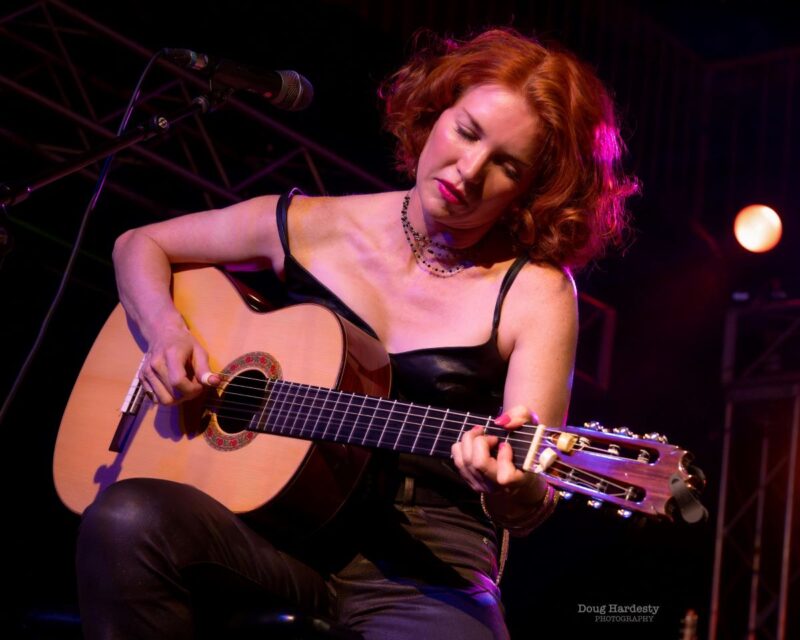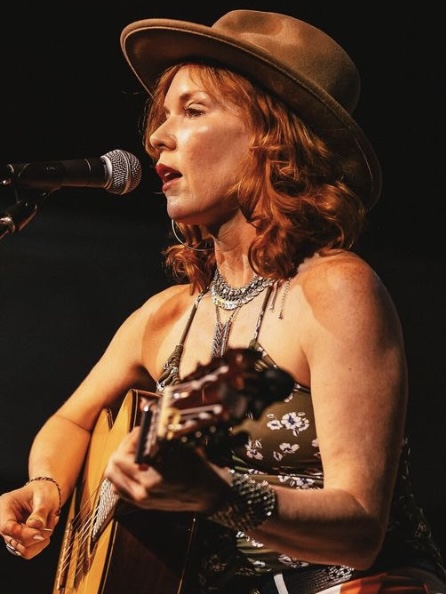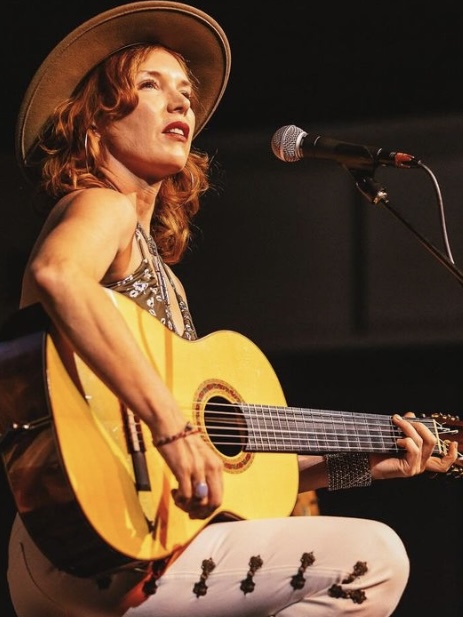
The terrific chanteuse Sue Foley emerged from Austin’s famed Antone’s scene (music club and record label). Originally from Ottawa, Canada, the roots & blues singer/songwriter and guitarist has reached international success as a top tier traditional blues performer. Foley is musically delightful, a powerfully expressive singer/songwriter and one of the bright lights of the American blues scene – and not just among the women. She’s one of the finest of the blues genre, period. It would be hard to top the strikingly accurate and near perfect quote by the Philadelphia Enquirer, “Foley has a killer voice, an impossibly alluring blend of sex and innocence to go with those blazing guitar chops.”All that, but we will add the fitting adjectives “tasteful, passionate and eloquent,” subtle musical traits which many of today’s blues guitarists are seemingly devoid of. She certainly deserves more recognition for her fierce and refined guitar chops, and it’s hard to fathom why that is so. Men with far lesser skills than her are often overrated and celebrated as guitar-heroes by the guitar finger gawkers, while Foley is underrated. Logic leads one to suspect sexism and misogyny. Yeah, she has all the kickass guitar chops like the best of them. Even as a young girl she could outplay most guys and they don’t like it a bit. She plays with true feeling, in the old way, when passion counted as much as fancy virtuosity.
Sue Foley started playing guitar at age fifteen after seeing blues singer James Cotton live in concert. At age sixteen, she already played professionally with local blues bands in Ottawa. In the mid-1980s, she formed her first group after moving to Vancouver. Around 1990, she sent a demo tape to Antone’s Records and that was the beginning of a hugely successful career. Her debut album with Antone’s in 1992, Young Girl Blues, received critical acclaim and nationwide radio airplay. She just issued her 17th album One Guitar Woman and it’s a hammer. Her music has been featured in the major motion picture You Can Count On Me, and she also contributed the theme song Two Trains, for the internationally syndicated television series Just Cause. She has been frequently featured in top tier print publications including The New York Times, The Los Angeles Times, The Toronto Globe and Mail, The National Post, Downbeat and Mojo Magazine, and has performed and been featured on nationally syndicated radio shows: House Of Blues, Sirius-XM’s BB King’s Bluesville, CBC’s Saturday Night Blues, NPR’s Mountain Stage, West Coast Live, Kentucky Woodsongs and Beale Street Caravan.
It’s impossible to write about Sue Foley and not acknowledge her stunning beauty. Seemingly the bard has found the fountain of youth. Her girlish voice, and equally youthful, pretty appearance belie a career that extended over three decades. Given the rough and tumble blues stereotypes, she’s too pretty to be a blues woman. She looks and sounds too young and innocent. By looking at her, you would think that she was a cover model, but she can sing the blues, and not just a little. Margaret Moser, of the Austin Chronicle, visited Foley in her home and described her as, “…a delicate young woman with gorgeous red-gold hair, ivory skin, and blue eyes as a tomboy.” To this writer, who never met her in person, she just looks like a nice Irish young lady from next door. Good looks don’t hurt a career, especially in the music world today, when sex-appeal, appearance and image are seemingly as important as musical competence. The difference is that Foley always stays respectable and dignified, and she can really play.
Foley is a seasoned and mature songwriter of deep substance and a refined fingerpicking guitarist. No wonder Foley was recognized with four consecutive ‘Traditional Blues Female’ Awards at the Blues Music Foundation ceremonies, a most prestigious accomplishment for any artist. Still, when she sings In My Girlish Ways by Memphis Minnie, it becomes clear that there are few people in the world who could be more fitting than Foley, with her sweet, gentle, and light approach. Light does not mean “lightweight” on any level. Intellectually, she is as strong as she is musically. When talking to her via the phone interview, it was evident that she is a thinker, a highly intelligent, articulate and incisive artist of considerable intellect and sharp wit. If she had chosen any other career, she impresses as someone who would be successful no matter what she did.

Chances are that some readers may not have perceived Sue Foley to fit into the acoustic blues category. While she is not exclusively so, she’s been playing acoustic music since the get-go. Like many, she started out as an acoustic player, and she has always used the thumb pick, plus she always included traditional blues on her records. Her 2004 album Change was an acoustic album, as is her 2024 record One Guitar Woman, a heartfelt tribute to diverse female pioneers of the guitar. Foley covered Memphis Minnie; the Mexican American guitarist and singer of Tejano and traditional Mexican American music, Lydia Mendoza; early country music singer Maybelle Carter; the French classical guitarist and composer Ida Presti; and the blues/gospel guitar pioneer Sister Rosetta Tharpe. The album features Foley’s considerable guitar virtuosity on acoustic nylon string guitar, with a guitar made by master flamenco guitar luthier Salvadore Castillo.
Known as the Ice Queen (also the name of her biggest hit) for her cool demeanor, Foley brings on Piedmont fingerpicking, traditional country, flamenco and classical tunes. The artist explained, “From the time I decided to be a professional guitar player, I’ve always looked for female role models. These are the women who were expressing themselves through the instrument as far back as the 1920’s, at the inception of radio and recorded music. They are the trailblazers and visionaries whose footsteps I walk in.”It’s easy to predict that this already critically acclaimed traditional solo album, diverse and multifaceted, will surely reap more accolades and awards for Foley.
Foley has toured internationally sharing the stage with greats such as B.B. King, Buddy Guy, Jimmie Vaughan (Fabulous Thunderbirds) and Billy F Gibbons (ZZ Top). She’s the only female member of the famed ensemble Jungle Show, which features Gibbons, Vaughan, and the B3 virtuoso Mike Flanigin, and Chris ‘Whipper’ Layton.
thecountryblues.com caught up with the singer/songwriter via telephone from Austin, Texas on May 14, 2024, to let her tell her own story:
“During the Covid time we all faced isolation, as did I. It’s not an easy business in general. The challenges for females are just different. Women musicians already face numerous challenges in a man’s world. We are and maybe physically smaller than the men I traveled with, and the industry is male dominated. There are certain things that happen to women – also the challenges of raising a child and being a traveling musician. One Guitar Woman was a project that was more than wanting to focus on these challenges, I wanted to focus on the artistry of these great women – all are important figures in music and culture. The focus wasn’t about hardship but really about the greatness of their artistry and how unique individuals they were because they did all this while being sort of isolated and without role models of their own. When you go back to people like Maybelle Carter or Memphis Minnie or Sister, Odetta, these are all self-created entities, which is really fascinating to me. They inspired me to learn their different guitar styles, for example to reach out and play a classical piece or play some flamenco, Spanish-style guitar – as a blues player that really turned my crank. For me has been fun and a real adventure.
I’ve got a love for Spanish guitar and Spanish nylon string guitar, and I started incorporating that into my sound a couple of decades ago – I think in 2000 with the album Love Coming Down I had a nylon string piece. I really get a thrill from Romance in A Minor by Niccolo Paganini because it’s classical. For me, as a blues player, to be able to get into a classical piece, I was very intimidated by it. I ended up doing it and I just felt really rewarded that I was able to stretch as a musician and go someplace I had never been before. It’s really an adventure.

Back as a young girl in Canada, I got into blues, primarily through the Rolling Stones. In my whole life I’ve been kind of interested in what created what. When I hear something that I like, I always try to figure out why I like it and what makes it what it is. My older brothers were into Zeppelin and Cream and ZZ Top and Deep Purple. That’s all blues based. I was hearing the blues from way back then. Seventies rock is all blues-based guitar driven rock ‘n’ roll. The Rolling Stones were my favorite band and when is started reading books about them and they’d be naming Muddy Waters and Slim Harpo and Jimmy Reed – and I would just be like, Well, who’s that? I’d go buy a Muddy Waters record and start reading books on that. It was historically inclined, I guess.
Memphis Minnie is still my favorite artist. She’s still the one that was my guiding light in blues, because I wanted to be a blues artist – and I still identify mainly as a blues musician. Minnie’s still number one. It begins and ends with her. She was so important, and so important to me.
When I got started, there weren’t a lot of women guitar players. There’s still fewer women than men playing guitar, but a lot more now. It’s not really an issue anymore, and it shouldn’t be. When I was starting there were hardly any women. I really felt isolated sometimes. Feeling a little isolated and a little alone in this field was a big part of my journey. I think I’ve done this project in some ways to tie it all together and create a community. Minnie was the first. She was the first impactful woman guitar player who had a real career, who wrote a long of songs, was very active and ambitious, was such an important figure.
I’ve been very blessed with people reaching out and helping me out. Early on, Ronnie Earl was very supportive. He’s been like a brother my whole career –a mentor of sorts. More recently, Jimmie Vaughan and Billy Gibbons have been supportive and mentors, just like big brothers. There are people in the field who I look up to – Mike Flanigin, the great Hammond B3 player, has been very supportive. He produced my last three albums.
My focus is the quality of my work. I don’t really worry about what’s popular and what’s not. I’ve been very blessed to be able to do that and make a living. I’ve never had to compromise and try to be more commercial. I try to do really good work. Everything we put out is top class. I use great artists, great photographers, great album designers, great producers and musicians. I’ve always tried to keep things very top shelf.
I love my job. There’s a lot of challenges I face with it, but I just persevere. I like what I do! I have strong friendships and a good family. I have a loving son – he’s 27 now, and you know I’m very close to him. My biggest success by far in life is raising my son to be a good human being. That is my biggest creative endeavor, my biggest success by far. Raising a good, functional human being is the greatest act of creativity you can do. That’s what we’re here for. I mean, all our work and all that – that’s secondary. I like my work, but I’m not completely defined by it. I really think my greatest success is just that and hopefully helping making people feel good when I play. That’s it.
I take care of myself. I get up early when I am at home. I exercise, I eat well, and I try to work hard. I practice every day as much as I can. I’m diligent and career driven, but I have a very good social life. I love to dance, I love to go out and hear music, I love to hear bands. You know, so try to keep it balanced. I take care of myself. I’m pretty basic.

I just try to get inspired as a songwriter. I try to think deeply about things. I think a lot. I’m an introvert. I absorb a lot of stuff and I hold it inside until I’m ready to express it. Sometimes it takes me years after things happen in my life to even be able to express it in words. I’m a “feeling artist” kind of person. I like to express myself instrumentally because I just think there’s so much to say without words. There’s so much that can be said without words. Sometimes words just for me aren’t enough. I mainly like to express myself through soloing and through my instrument. I’m just think deeply and absorb life and relationships and experiences and try to process them. When you’re hearing something on an album, it probably happened. I don’t write fiction; I write truth. I write what I know. I think that as a blues musician that makes you more authentic. If you’re experiencing something and it’s true, that’s what blues is for – in true experiences, understanding life. I process very slowly. I express things over time.
I respect my blues pals and compatriots. We all work so hard. This isn’t easy work. This is hard. It’s difficult. It’s challenging and it doesn’t seem to get easier as you get older. I have utmost respect for my peers who are in this business. I was just at the Blues Foundation awards in Memphis last week and I was thinking, God, we all work so hard. Everybody is busting their asses out there. Sometimes when you do really good work it deserves to be recognized. When your work stands above everything else, hey, I don’t have any problem getting an award for that if I think I’ve really done something out of the ordinary or extraordinary or compelling. I don’t mind being recognized for that. I have learned over the last couple of years, is that it’s about the work, it’s not about me. It’s my work. There’s one degree of separation there that I just try to do good work, and if it gets recognized, hey great.
I’m in my mid-fifties. I have a long way to go, and in fact in the blues world this is prime time. This is a great time. No, the challenge has really been with myself, with just being able to get over any mental obstacles I have that prevent me from where I want to go. I need to think about being good to myself and being supportive of myself, because sometimes I can be self-critical. I think most artists can be self-critical because you think it’s not good enough or I should be better. I should be here. I should be there. I think stopping and appreciating where you’re at and really giving yourself a pat on the back every now and then is important, and I think maybe my biggest challenge has been that, because I tend to be ambitious and kind of self-critical sometimes.
I like expansion. I’ve grown to appreciate new art, new music more than I ever have before, because I was always such a traditionalist that I was always looking back. I think I’ve grown to keep my eyes open what’s going on now, which is kind of interesting. I really like cultural stuff that’s far from my culture. I went to some Japanese punk show. Just some wild shit. We were just at the New Orleans Jazz Fest where I saw a bunch of – traditional Colombian music. I love cultural stuff like that and different sounds and different instruments. I am not necessarily getting my inspiration through just listening to guitar music, especially blues rock does not interest me at all.
I came up with the Texas blues, which has a different aesthetic for sure. I’m now getting inspiration from other instruments, other sounds. I love being a little softer musically so you can hear everything and not just getting bombarded. I still like to rock as well, and performance – playing live is really where I get most of my inspiration, to be honest, is being able to just play.
It’s been great living in Austin. Austin is great. It’s a supportive music scene. The musicians really look out for one another. If somebody has hardships, they’re there to support each other, no matter what sorrow. The blues scene here is smaller now than other areas. Austin has a lot of singer-songwriters and there’s a lot of funk and soul now. I kind fit in where I fit in. I’m from the Antone’s scene. I’ve been here for a long time. By now, I’m one of the elders. I think I am respected and part of the historical fabric of what helps build this music scene. I come under the lineage of Jimmie Vaughan with Angela Strehli and Lou Ann Barton. We were the next people in line. I think I fit in quite well. I just played the Austin Blues Fest, and it was great, because it was a lot of Antone’s people and remembering – the blues is not a big deal in Austin anymore as it was when I got here, but the Austin scene has changed a lot.”
Sue Foley is all that! She sings like a sweet angel and plays guitar as if she was born in the southside of Chicago.